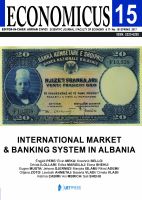Analysis of the implementation process of SAPARD and IPARD programme in Slovenia and Macedonia
Analysis of the implementation process of SAPARD and IPARD programme in Slovenia and Macedonia
Author(s): Ani MbricaSubject(s): National Economy, Agriculture, Economic development, Financial Markets, Socio-Economic Research
Published by: Shtëpia botuese “UET Press”
Keywords: Pre-accession instruments; SAPARD and IPARD; Implementation process; Financial support; Agricultural holdings;
Summary/Abstract: The Special Accession Programme for Agriculture and Rural Development (SAPARD) and the Instrument for Pre-Accession Assistance in Rural Development (IPARD) are two pre – accession instruments designed by European Union for the preparation of agricultural sector and rural areas of candidate countries. The aim of this study is to analyse the performance and the effect of the implementation process of the two preaccession programmes for agriculture and rural development in Slovenia and Macedonia, which have implemented the respective programmes within a specific period of time. The study has been carried out by calculating and comparing the same appropriate indicators within the programmes: timeline of programs, implemented measures, financial support and agricultural holdings supported by the programs The results revealed that both programmes in respective countries, faced difficulties on setting up in due time the administrative system of SAPARD and IPARD programmes, by causing a delay in the implementation process with negative effects on the performance of the programmes. The results also revealed that both countries approved and completed only a few projects. This effect is probably due to the high rate of bureaucracy associated with project preparation (extremely demanding and time-consuming) and the not well-defined functioning of the submission process which ended in the rejection of a large number of applications. This rejection explains why both programmes reached only a few agricultural holdings in the respective countries.
Journal: ECONOMICUS
- Issue Year: 15/2017
- Issue No: 1
- Page Range: 171-186
- Page Count: 16
- Language: English

